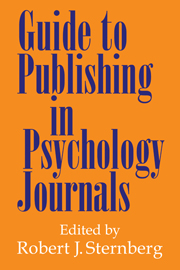Book contents
- Frontmatter
- Contents
- Preface
- PART ONE INTRODUCTION
- PART TWO PARTS OF AN ARTICLE
- 3 Titles and Abstracts: They Only Sound Unimportant
- 4 Introducing Your Research Report: Writing the Introduction
- 5 Theories and Hypotheses
- 6 Writing Effectively about Design
- 7 Doing Data Analyses and Writing Up Their Results: Selected Tricks and Artifices
- 8 Results That Get Results: Telling a Good Story
- 9 What Does It All Mean? The Discussion
- 10 Documenting Your Scholarship: Citations and References
- PART THREE DEALING WITH REFEREES
- PART FOUR CONCLUSION
- Index
3 - Titles and Abstracts: They Only Sound Unimportant
Published online by Cambridge University Press: 05 February 2012
- Frontmatter
- Contents
- Preface
- PART ONE INTRODUCTION
- PART TWO PARTS OF AN ARTICLE
- 3 Titles and Abstracts: They Only Sound Unimportant
- 4 Introducing Your Research Report: Writing the Introduction
- 5 Theories and Hypotheses
- 6 Writing Effectively about Design
- 7 Doing Data Analyses and Writing Up Their Results: Selected Tricks and Artifices
- 8 Results That Get Results: Telling a Good Story
- 9 What Does It All Mean? The Discussion
- 10 Documenting Your Scholarship: Citations and References
- PART THREE DEALING WITH REFEREES
- PART FOUR CONCLUSION
- Index
Summary
What could be more boring than titles and abstracts, or than an article entitled “Titles and Abstracts”? Yet few aspects of the article are more important than, you guessed it, titles and abstracts. Let's stop being abstract and get concrete. Why are they so important?
Capturing attention. I sometimes tell my students that, when you write, you have a minute or two, rarely longer, to capture a reader's attention. Either they are with you after that minute or two, or they are gone or not paying attention. As readers start with the title and typically proceed to the abstract, much of the minute or two and sometimes all of it are spent on these opening lines. If the title does not capture interest, readers are unlikely to proceed any further. Often readers scan a table of contents and decide whether the title justifies their even turning to the article. If it does not, you lose your reader. If readers make it to the actual article, often they then decide whether to proceed on the basis of the abstract. If the abstract does not interest them, they read no further. Whether your article will be read by many people, few people, or virtually none at all thus can be largely a function of the title and the abstract.
[…]
- Type
- Chapter
- Information
- Guide to Publishing in Psychology Journals , pp. 37 - 40Publisher: Cambridge University PressPrint publication year: 2000
- 4
- Cited by



